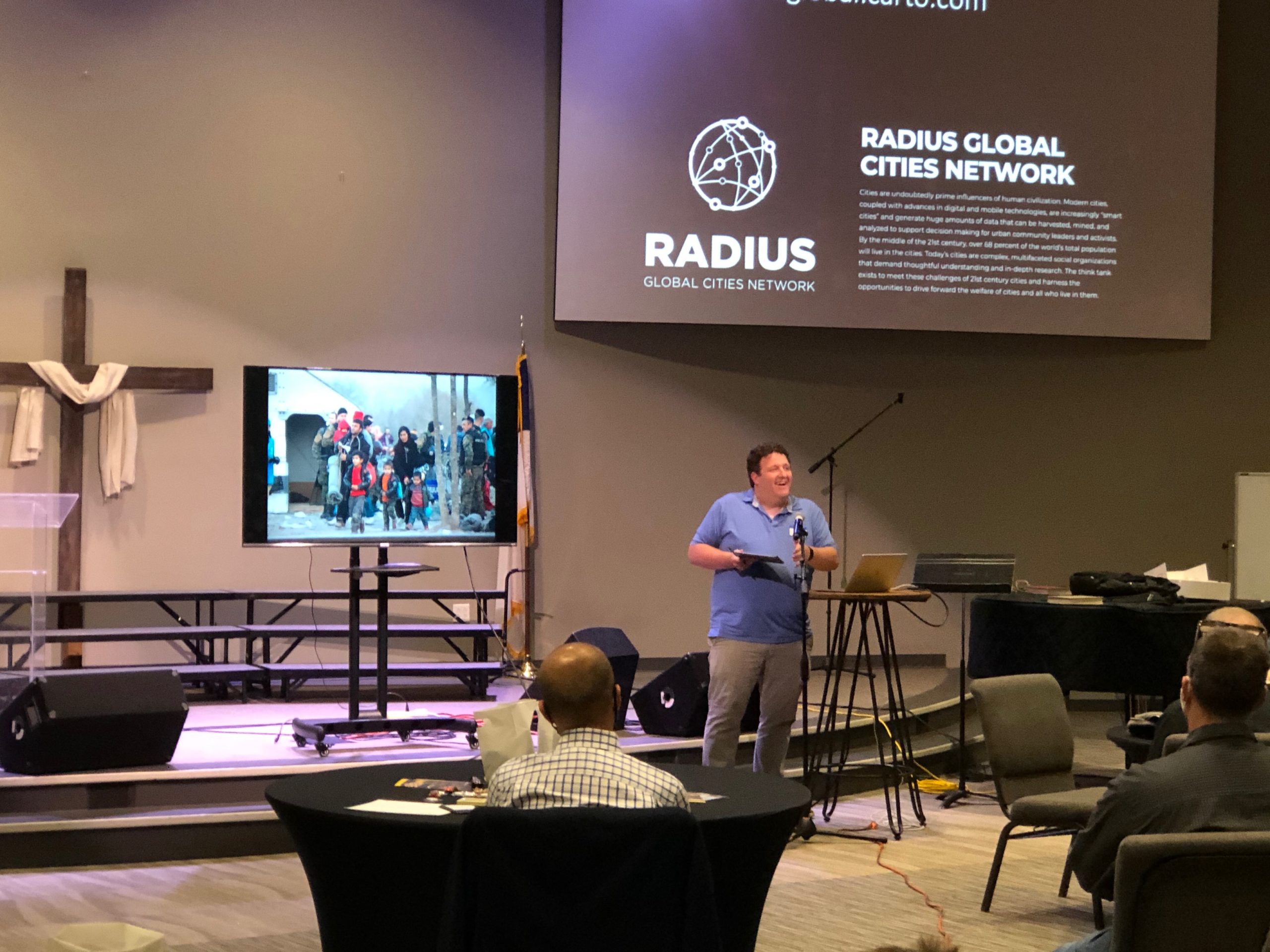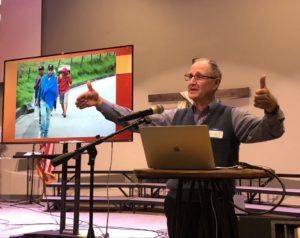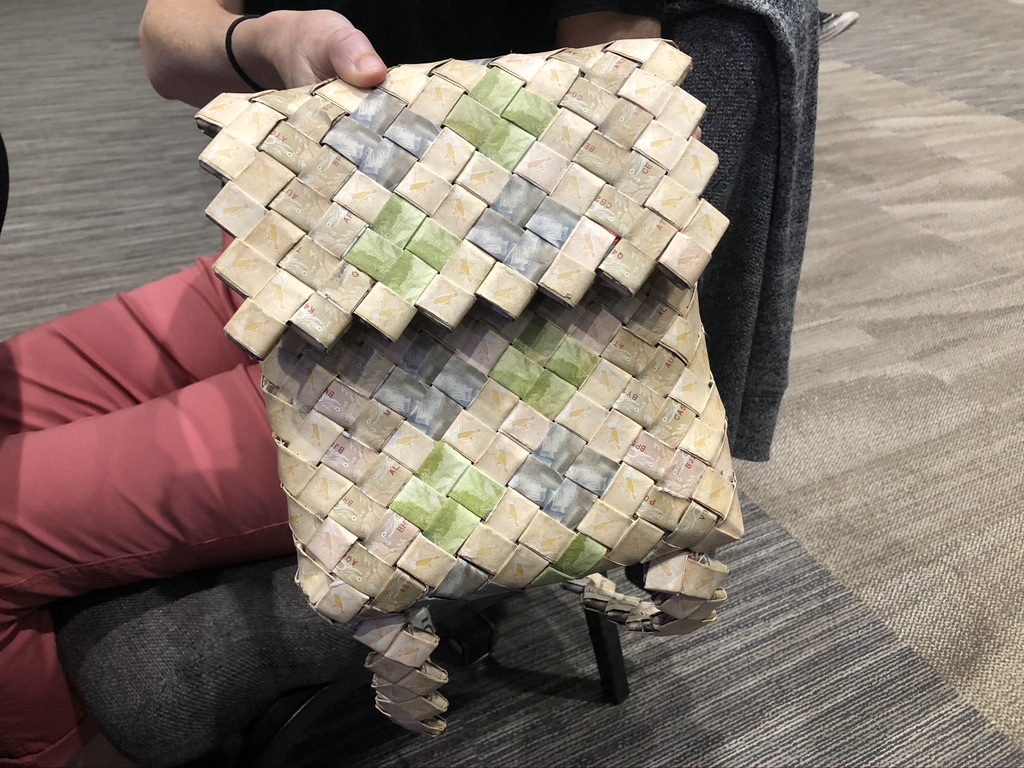Leaders discuss ministry to refugees in cities

About 40 Christian practitioners and leaders representing a variety of organizations serving refugees, internally displaced peoples, and asylum seekers gathered in one of the most diverse square miles in the continental U.S. April 9th to discuss growing trends in refugees living in cities and how to assist them in whatever stage on the refugee highway they are experiencing.
“Cities are becoming the new refugee camps,” said Radius Global Cities Network Director Minh Ha Nguyen, who in his research found that 95 percent of the world’s migrants now reside in cities. “Refugee camps in the countryside may be a reality, but cities are better places where they can spend time in transit. So what if city teams on main migration routes connect and cooperate as good Samaritans on the refugee highway?”
The network gathered in-person and virtual attendees in the eastern Atlanta suburb of Clarkston, Ga., in which around 120 ethnic groups speaking more than 100 mother tongues reside, for the “Refugees, Cities, and Diaspora Movements: One Day Consultation” at Send Relief’s Clarkston Ministry Center to discuss ministry to people the world over “on the move.”
Radius Global Cities Network Director Michael Crane said the Bible contains an overarching theme of God’s followers being sojourners – from Abraham to the exiles sent to Assyria and Babylon to the Christian diaspora in Acts.
“The church is at its best when it shares the characteristics of a sojourner,” he said. “The church will do well to see itself as a sojourner who is to be light to the nations. This does require deeper immersion in the biblical narrative because we are sojourners as the Israelite people were.”
Biblical commands to treat the stranger kindly appear throughout the Pentateuch and even in Malachi 3:5, which says that those who oppress sojourners will be judged, Crane said. But he said the global evangelical church has struggled to see refugees through biblical lenses.
“Evangelical Christians have a negative view of refugee resettlement,” he said, citing Pew Research and Public Religion Research Institute findings. “They’re the only major religious group to think so. But every refugee regardless of background or motive bears the image of God. The church needs to adjust the ways we see and understand refugees, so that we can love refugees as God does.”
Greg Wilton, who directs the Clarkston Ministry Center for Send Relief, said work with immigrants, refugees, and the diaspora is crucial for the health of the North American church, though it doesn’t get proper attention.
“The majority of North American Christians, in my opinion, are still in a ministry ‘to’ era when it should be a ministry ‘with’ era,” he said. “It’s a great time to be alive with God’s global movements. It used to be from the West to the rest, and now it’s from everywhere to everyone.”
He cited author and Biola University professor Dr. Tom Steffen, who said interdependence – between dependence and independence — is the best way forward for planting healthy multiplying churches among refugees and immigrants in North America.
“Dependence is colonialism – a ‘you need us’ mentality,” he said. “Independence is nationalism – a ‘we don’t need you’ mentality. Interdependence is globalization which is a ‘we need each other’ mentality. Ministry to the whole world truly excels best when it is ministry alongside the whole church.”
Wilton also said that including compassion ministries among refugees and immigrants is a pursuit of the whole gospel rather than a watering down of it.
“Pursuit of solid entry strategies among refugees and immigrants are very beneficial to the pursuit of healthy multiplying churches,” he said. “We need to be more O.K. with this in order for this to lead to gospel advance.”
Abraham Shepherd — Send Relief area director for Europe, North Africa, and the Middle East — said the refugee highway consists of three basic stops that all require different approaches to ministry. The stops are the refugee-producing countries, the transit countries, and the host country – where each refugee ideally wants to reach.
“More people are open to the gospel in transit countries because they feel lost and need direction, or they are confused and at the end of their rope,” he said. “When they reach a place of resettlement, ministries have a year and a half to make impact. After that, the refugees are so busy working, making money, and building their dream and future. But they will never forget the people who welcome them.”
The consultation heard and responded to case studies from different places around the world along the refugee highway, including from the millions fleeing a mismanaged Venezuela. Paul Tinley lived in Venezuela for 27 years and currently ministers to people walking into and settling in Colombia – known as the “caminantes” or “walkers”.

“The choice is to stay and starve, or leave and start over,” he said. “Venezuela is bleeding to death.”
The inflation rate is the highest in the world, with the monthly minimum wage salary covering 0.57 percent of essential needs. Tinley showed the crowd a shoulder bag made of washed-out Venezuelan money which before the crisis would’ve been made from the equivalent of $2,000. A joint project Tinley helps with provides housing, new shoes, jackets for the high mountain pass the “caminantes” must climb, as well as a gospel witness.
“What if this became a way to engage people on the move with ministry houses,” said Alan Cross, pastor of Petaluma Valley Baptist Church, Petaluma, Calif., in response to Tinley’s case study. “What if we equip and network indigenous Christians wherever people are transferring through and receive and disciple them? How can the church be the ones who come aside to help like the Good Samaritan and share the gospel, but also identify Christians traveling through and help them be purposeful?”
In future weeks, this website will publish more in-depth reports of some of the reports presented during the refugee consultation.

